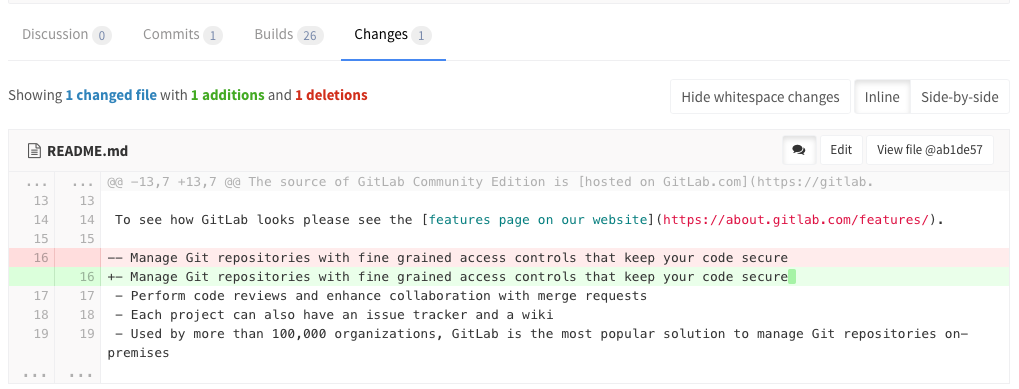GitSwarm-EE 2017.1-1 Documentation
- Merge Requests
- Authorization for merge requests
- Cherry-pick changes
- Merge when build succeeds
- Resolve discussion comments in merge requests reviews
- Resolve conflicts
- Revert changes
- Merge requests versions
- Work In Progress merge requests
- Merge request approvals
- Ignore whitespace changes in Merge Request diff view
- Tips
Merge Requests
Merge requests allow you to exchange changes you made to source code and collaborate with other people on the same project.
Authorization for merge requests
There are two main ways to have a merge request flow with GitSwarm:
- Working with protected branches in a single repository
- Working with forks of an authoritative project
Learn more about the authorization for merge requests.
Cherry-pick changes
Cherry-pick any commit in the UI by simply clicking the Cherry-pick button in a merged merge requests or a commit.
Learn more about cherry-picking changes.
Merge when build succeeds
When reviewing a merge request that looks ready to merge but still has one or more CI builds running, you can set it to be merged automatically when all builds succeed. This way, you don't have to wait for the builds to finish and remember to merge the request manually.
Learn more about merging when build succeeds.
Resolve discussion comments in merge requests reviews
Keep track of the progress during a code review with resolving comments. Resolving comments prevents you from forgetting to address feedback and lets you hide discussions that are no longer relevant.
Read more about resolving discussion comments in merge requests reviews.
Resolve conflicts
When a merge request has conflicts, GitSwarm may provide the option to resolve those conflicts in the GitSwarm UI.
Learn more about resolving merge conflicts in the UI.
Revert changes
GitSwarm implements Git's powerful feature to revert any commit with introducing a Revert button in merge requests and commit details.
Learn more about reverting changes in the UI
Merge requests versions
Every time you push to a branch that is tied to a merge request, a new version of merge request diff is created. When you visit a merge request that contains more than one pushes, you can select and compare the versions of those merge request diffs.
Read more about the merge requests versions.
Work In Progress merge requests
To prevent merge requests from accidentally being accepted before they're completely ready, GitSwarm blocks the "Accept" button for merge requests that have been marked as a Work In Progress.
Learn more about settings a merge request as "Work In Progress".
Merge request approvals
If you want to make sure every merge request is approved by one or more people, you can enforce this workflow by using merge request approvals. Merge request approvals allow you to set the number of necessary approvals and predefine a list of approvers that will need to approve every merge request in a project.
Read more about merge request approvals.
Ignore whitespace changes in Merge Request diff view
If you click the Hide whitespace changes button, you can see the diff without whitespace changes (if there are any). This is also working when on a specific commit page.

**Tip:** You can append
?w=1while on the diffs page of a merge request to ignore any whitespace changes.
Tips
Here are some tips that will help you be more efficient with merge requests in the command line.
Note: This section might move in its own document in the future.
Checkout merge requests locally
A merge request contains all the history from a repository, plus the additional commits added to the branch associated with the merge request. Here's a few tricks to checkout a merge request locally.
Please note that you can checkout a merge request locally even if the source project is a fork (even a private fork) of the target project.
Checkout locally by adding a git alias
Add the following alias to your ~/.gitconfig:
[alias]
mr = !sh -c 'git fetch $1 merge-requests/$2/head:mr-$1-$2 && git checkout mr-$1-$2' -Now you can check out a particular merge request from any repository and any remote. For example, to check out the merge request with ID 5 as shown in GitSwarm from the upstream remote, do:
git mr upstream 5This will fetch the merge request into a local mr-upstream-5 branch and check it out.
Checkout locally by modifying .git/config for a given repository
Locate the section for your GitSwarm remote in the .git/config file. It looks like this:
[remote "origin"]
url = https://gitlab.com/gitlab-org/gitlab-ce.git
fetch = +refs/heads/*:refs/remotes/origin/*You can open the file with:
git config -eNow add the following line to the above section:
fetch = +refs/merge-requests/*/head:refs/remotes/origin/merge-requests/*In the end, it should look like this:
[remote "origin"]
url = https://gitlab.com/gitlab-org/gitlab-ce.git
fetch = +refs/heads/*:refs/remotes/origin/*
fetch = +refs/merge-requests/*/head:refs/remotes/origin/merge-requests/*Now you can fetch all the merge requests:
git fetch origin
...
From https://gitlab.com/gitlab-org/gitlab-ce.git
* [new ref] refs/merge-requests/1/head -> origin/merge-requests/1
* [new ref] refs/merge-requests/2/head -> origin/merge-requests/2
...And to check out a particular merge request:
git checkout origin/merge-requests/1